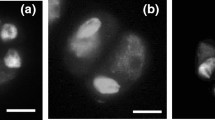Abstract
Polyploidization or whole genome duplication (WGD) is one of the main forces driving plant genome evolution and biodiversity with major implications for plant breeding and crop improvement. In nature, de novo formation of polyploid plant genomes most likely occurs through a modification of the sexual reproductive pathway. By interfering with reproductive genome stability, for example, via induction of meiotic restitution, diploid or polyploid gametes are ectopically formed that may participate in fertilization to yield polyploid offspring. This mechanism of WGD is generally referred to as sexual polyploidization. Considering the central role of sexual polyploidization in speciation, genome evolution and crop breeding, we provide here a set of methodologies to induce and characterize 2n pollen grain formation in plants. Using Arabidopsis thaliana as a model, we outline two different methods, that is, one chemical and one environmental, to induce male meiotic restitution and high frequency 2n pollen grain formation. In addition, we provide a set of simple and straightforward techniques to characterize alterations in male meiotic cell division and gametophytic ploidy stability underpinning 2n pollen formation. This comprehensive toolbox is applicable in a broad range of plant species to enable quick induction and assessment of 2n gamete formation during plant male reproduction.
Access this chapter
Tax calculation will be finalised at checkout
Purchases are for personal use only
Similar content being viewed by others
References
Jiao YN, Wickett NJ, Ayyampalayam S et al (2011) Ancestral polyploidy in seed plants and angiosperms. Nature 473:97–100
Landis JB, Soltis DE, Li Z et al (2018) Impact of whole-genome duplication events on diversification rates in angiosperms. Am J Bot 105:348–363
Soltis PS, Soltis DE (2016) Ancient WGD events as drivers of key innovations in angiosperms. Curr Opin Plant Biol 30:159–165
Leitch AR, Leitch IJ (2008) Genomic plasticity and the diversity of polyploid plants. Science 320:481–483
Cheniclet C, Rong WY, Causse M et al (2005) Cell expansion and endoreduplication show a large genetic variability in pericarp and contribute strongly to tomato fruit growth. Plant Physiol 139:1984–1994
De Storme N, Geelen D (2013) Sexual polyploidization in plants cytological mechanisms and molecular regulation. New Phytol 198:670–684
Wijnker E, Schnittger A (2013) Control of the meiotic cell division program in plants. Plant Reprod 26:143–158
Pecrix Y, Rallo G, Folzer H et al (2011) Polyploidization mechanisms: temperature environment can induce diploid gamete formation in Rosa sp. J Exp Bot 62:3587–3597
De Storme N, Mason A (2014) Plant speciation through chromosome instability and ploidy change: cellular mechanisms, molecular factors and evolutionary relevance. Curr Plant Biol 1:10–33
Lu M, Zhang PD, Kang XY (2013) Induction of 2n female gametes in Populus adenopoda maxim by high temperature exposure during female gametophyte development. Breed Sci 63:96–103
Mason AS, Nelson MN, Yan GJ et al (2011) Production of viable male unreduced gametes in Brassica interspecific hybrids is genotype specific and stimulated by cold temperatures. BMC Plant Biol 11:103
Negri V, Lemmi G (1998) Effect of selection and temperature stress on the production of 2n gametes in Lotus tenuis. Plant Breed 117:345–349
Rezaei M, Arzani A, Sayed-Tabatabaei BE (2010) Meiotic behaviour of tetraploid wheats (Triticum turgidum L.) and their synthetic hexaploid wheat derivates influenced by meiotic restitution and heat stress. J Genet 89:401–407
Wang J, Li DL, Shang FN et al (2017) High temperature-induced production of unreduced pollen and its cytological effects in Populus. Sci Rep 7:5281
Younis A, Hwang YJ, Lim KB (2014) Exploitation of induced 2n-gametes for plant breeding. Plant Cell Rep 33:215–223
Engel ML, Davis RH, Mccormick S (2005) Green sperm. Identification of male gamete promoters in Arabidopsis. Plant Physiol 138:2124–2133
De Storme N, Copenhaver GP, Geelen D (2012) Production of diploid male gametes in arabidopsis by cold-induced destabilization of postmeiotic radial microtubule arrays. Plant Physiol 160:1808–1826
De Storme N, Geelen D (2011) The Arabidopsis mutant jason produces unreduced first division restitution male gametes through a parallel/fused spindle mechanism in meiosis II. Plant Physiol 155:1403–1415
Liu B, De Storme N, Geelen D (2018) Cold-induced male meiotic restitution in Arabidopsis thaliana is not mediated by GA-DELLA signaling. Front Plant Sci 9:91
Liu B, De Storme N, Geelen D (2017) Gibberellin induces diploid pollen formation by interfering with meiotic cytokinesis. Plant Physiol 173:338–353
Altmann T, Damm B, Frommer WB et al (1994) Easy determination of ploidy level in Arabidopsis thaliana plants by means of pollen size measurement. Plant Cell Rep 13:652–656
De Storme N, Zamariola L, Mau M et al (2013) Volume-based pollen size analysis: an advanced method to assess somatic and gametophytic ploidy in flowering plants. Plant Reprod 26:65–81
Sakhanokho HF, Islam-Faridi MN (2014) Spontaneous autotetraploidy and its impact on morphological traits and pollen viability in Solanum aethiopicum. HortScience 49:997–1002
Johansen B, Vonbothmer R (1994) Pollen size in Hordeum L.: correlation between size, ploidy level, and breeding system. Sex Plant Reprod 7:259–263
Katsiotis A, Forsberg RA (1995) Pollen grain size in four ploidy levels of genus Avena. Euphytica 83:103–108
Schindelin J, Rueden CT, Hiner MC et al (2015) The ImageJ ecosystem: an open platform for biomedical image analysis. Mol Reprod Dev 82:518–529
Acknowledgments
We would like to thank C. Petit and P. Vandenbroucke for practical assistance with the growing and maintenance of Arabidopsis plants. Also many thanks to Prof. M. Höfte (Phytopathology Lab, UGent) for the use of the light microscopy platform.
Author information
Authors and Affiliations
Corresponding author
Editor information
Editors and Affiliations
Rights and permissions
Copyright information
© 2020 Springer Science+Business Media, LLC, part of Springer Nature
About this protocol
Cite this protocol
De Storme, N., Geelen, D. (2020). Induction and Characterization of Diploid Pollen Grains in Arabidopsis thaliana. In: Pradillo, M., Heckmann, S. (eds) Plant Meiosis. Methods in Molecular Biology, vol 2061. Humana, New York, NY. https://doi.org/10.1007/978-1-4939-9818-0_23
Download citation
DOI: https://doi.org/10.1007/978-1-4939-9818-0_23
Published:
Publisher Name: Humana, New York, NY
Print ISBN: 978-1-4939-9817-3
Online ISBN: 978-1-4939-9818-0
eBook Packages: Springer Protocols




